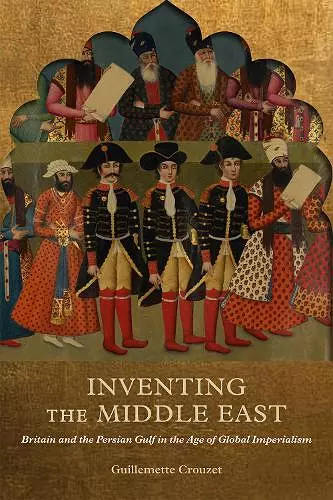Inventing the Middle East
Britain and the Persian Gulf in the Age of Global Imperialism
Format:Paperback
Publisher:McGill-Queen's University Press
Published:15th Oct '22
Should be back in stock very soon

How the idea of the Middle East emerged amid the contested waters and sands of the nineteenth-century Persian Gulf.
The “Middle East” has long been an indispensable and ubiquitous term in discussing world affairs, yet its history remains curiously underexplored. In Inventing the Middle East Guillemette Crouzet charts the spatial, political, and cultural emergence of the Middle East, not in the twentieth century but in the nineteenth.
The “Middle East” has long been an indispensable and ubiquitous term in discussing world affairs, yet its history remains curiously underexplored. Few question the origin of the term or the boundaries of the region, commonly understood to have emerged in the twentieth century after World War I.
Guillemette Crouzet offers a new account in Inventing the Middle East. The book traces the idea of the Middle East to a century-long British imperial zenith in the Indian subcontinent and its violent overspill into the Persian Gulf and its hinterlands. Encroachment into the Gulf region began under the expansionist East India Company. It was catalyzed by Napoleon’s invasion of Egypt and heightened by gunboat attacks conducted in the name of pacifying Arab “pirates.” Throughout the 1800s the British secured this crucial geopolitical arena, transforming it into both a crossroads of land and sea and a borderland guarding British India’s western flank. Establishing this informal imperial system involved a triangle of actors in London, the subcontinent, and the Gulf region itself. By the nineteenth century’s end, amid renewed waves of inter-imperial competition, this nexus of British interests and narratives in the Gulf region would occasion the appearance of a new name: the Middle East.
Charting the spatial, political, and cultural emergence of the Middle East, Inventing the Middle East reveals the deep roots of the twentieth century’s geographic upheavals.
“A welcome reassessment that not only shows how Britain’s empire in the Middle East began and ended in the Persian Gulf but reminds us of the violence and contestation of that colonial relationship. Meticulously researched and rigorously argued – an outstanding book.” Eugene Rogan, University of Oxford and author of The Arabs: A History
“Deeply researched and elegantly written, Crouzet’s Inventing the Middle East offers a major intervention in historical analysis of Britain’s conception of the nineteenth-century Persian Gulf. Taking archaeologists, cartographers, colonial bureaucrats, pearl fishers, slave traders, steam technologists, and Wahhabis into her capacious purview, Crouzet expertly anatomizes the emergence of the Gulf.” Margot Finn, University College London
“Crouzet re-centres the Gulf in early globalizing flows and provides a welcome antidote to more conventional accounts that treat the region as peripheral to world history prior to the discovery and extraction of oil.” International Affairs
“Crouzet provides an “aquatic and amphibious history” of the region, primarily through the prism of British records [and] delivers a highly readable and methodologically sound account of how the British envisioned and shaped the Gulf from the 1780s to the early 20th century. The book carefully deconstructs the hybrid political and legal architecture that resulted from the interactions between the most powerful empire of the late 19th century and local stakeholders.” *International Journal of Middle Eastern Studies *
ISBN: 9780228014065
Dimensions: unknown
Weight: unknown
304 pages